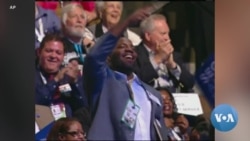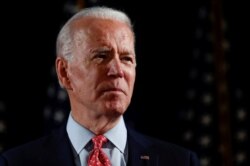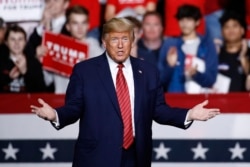If the coronavirus pandemic forces large-scale events to be either discouraged or cancelled this summer, American political conventions may be among the country’s cultural casualties.
Instead of the four-day festival that fills sports arenas, a virtual convention would connect thousands of delegates from all 50 states, plus U.S. territories, to cast votes on everything from political party rules to selecting who will run for president – all on a Zoom-like platform.
Currently, the two parties are scheduled to hold back-to-back conventions in mid- to late August, with the Democrats convening in Milwaukee, Wisconsin, followed by the Republicans gathering in Charlotte, North Carolina. Presumptive Democratic presidential nominee Joe Biden has hinted that his party may opt for a virtual convention if the pandemic continues to rage on, while President Donald Trump has been emphatic in saying his party would gather to nominate him for a second term.
But there’s no way of knowing at this point how the conventions will play out, and politicians and political analysts are intensely speculating on what a virtual convention might look like.
“There’s two aspects to this. There’s the legal and the political,” says Elaine Kamarck, a member of the Democratic National Committee and Director of the Center for Effective Public Management. She says the roll call vote for the nominee “is the way that a presidential candidate gets on the ballots in all the states. So legally, you have to have a convention.”
And the political?
“[Conventions] are great festive occasions to bring together like-minded partisans to unify the party around the nominee, get them excited about the fall campaign,” says Lara Brown, director of the Graduate School of Political Management (GSPM) at George Washington University.
Staging a virtual convention
Brown believes a virtual convention needs to incorporate at least three different aspects. “There needs to be one secure platform for the delegates to be able to cast their votes … another type of platform for participatory engagement. Then I think there needs to be a third platform that is about the production, the production of the show,” she said.
Convention halls filled with thousands of partisans have historically provided television networks with a built-in background and at times, drama. How would a virtual convention translate to TV audiences? Essentially, it would have to be done by creating the illusion of a bustling convention amid balloons, placards and bunting through the magic of television.
“I'm not sure that producing a TV show without 20,000 people in an arena is going to be any worse than what we traditionally have,” Kamarck said.
“And the show is likely going to be a very complicated one in which probably no one has a better sense of that than kind of the major broadcast networks who do these kinds of live events like the Super Bowl,” said Brown. She believes the outward facing show platform can intertwine with a platform for citizen participation.
“Perhaps we see as we do with television shows like Dancing with the Stars, people voting, you know, via phone and they text in their ballots,” Brown said.
And if the coronavirus pandemic eases enough to allow small gatherings, she sees delegates hosting house parties that she called “a nationwide meetup.”
Virtual or conventional convention?
Former Vice President Joe Biden suggested the idea of a virtual convention in early April, days after Democrats moved the dates of their convention in Milwaukee from July 13-16 to August 17-20. That is one week prior to the Republican convention in Charlotte, August 24-27.
Trump has mocked Biden’s virtual convention suggestion. Both Republican and Democratic party chairpersons recently said plans for live, in-person conventions are proceeding.
If circumstances force a change, Brown is interested to see which party produces a better virtual experience. “We have watched parties do national conventions for years. They know what are the best ways to gain attention and excite their partisans. But this would be a whole new world. And what that means in terms of the creativity and the ingenuity is really an unknown. And there might be a differential advantage for one party or another as they proceed down this path.”
Kamarck notes the final decision on how to hold the convention is not necessarily in the parties’ control. “If, in fact, we are still in this kind of very difficult situation, there's going to be people in Milwaukee who don't want to work at the convention. There will be people at Charlotte who don't want to work at the convention. There will be people in both cities who do not look forward to having 20 to 30 thousand people from all over the country,” Kamarck observed.







